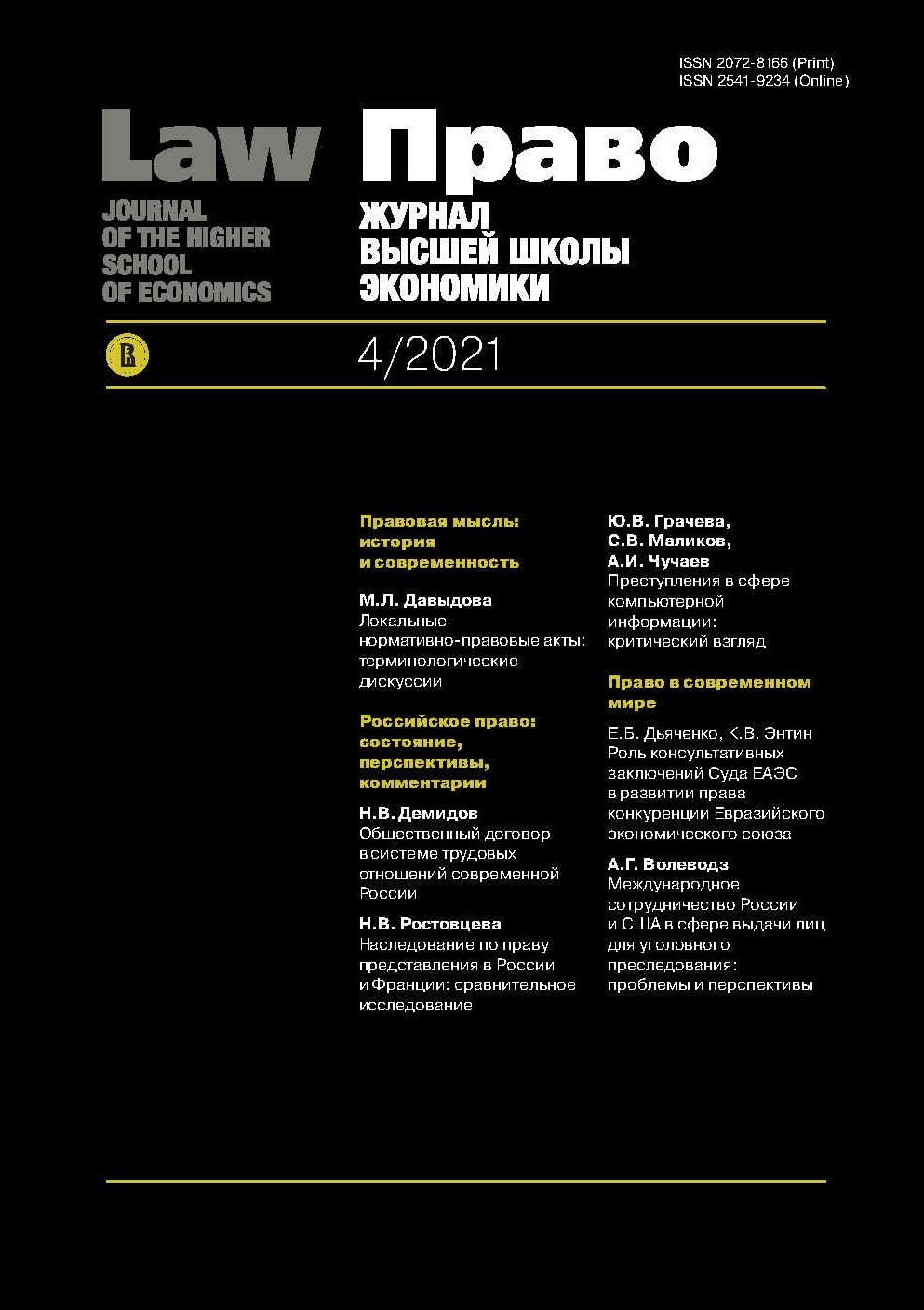Concept of Economic Dependence in Business Regulation
Abstract
Economic dependence and prohibition of abuse thereof are traditional institutes of competition law. Although we cannot observe it in EU competition law, it exists and it is used very efficiently in many national laws. By prohibition of abuse of economic dependence it solves a crucial problem of prevention of abuse of dependent party position. The analysis is through and it embraces both law and practice. Comparing economic dependence and dominance as well as abuse thereof author identifies common and different features. Elements of power, influence on counterparties, ability to define their mode to conduct business and absence of any viable alternative are those in common. The different features are those connected with quantitative characteristics of the market dominance and the scale of the market power. Abuse of the economic dependence as well as abuse of market dominance also have much in common, especially if so called “contract related” abuses are in question. However author believes that the scope of the application of these prohibitions is absolutely different although the practices in question may look similar in similar situations. It is worth adding that prohibition of abuse of economic dependence covers and thus is capable to solve the problems that the prohibition of the abuse of dominance is unable to solve. In addition contract models admissible under traditional competition law are prohibited if applied to establish economic dependence or to abuse thereof. Upon the results of the comparison author believes that economic dependence is one of the categories of the economic law with very wide application scope and high functionality.
References
Blocx J. (2021) Belgian Prohibition of Abuse of Economic Dependence Enters into Force. Journal of European Competition Law & Practice, vol. 12, no. 4, pp. 322-329.
Boy L. (2010) Abus de dependence economique: Reculer por mieux sauter? Revue Lamy de la Concurrence, no. 23, pp. 21-93.
Cayot M., Depincé M., Mainguy D. (2019) Droit de la concurrence. Paris: LexisNexis, 446 p.
Di Porto F., Podszun R. (2018) Abusive Practices in Competition Law. Cheltenham: Edward Elgar, 552 p.
Geradin D., Layne-Farrar L., Petit N. (2012) EU Competition Law and Economics. Oxford: University Press, 600 p.
Graef I. (2016) EU Competition Law, Data Protection and Online Platforms: Data as Essential Facility (International Competition Law). Alphen an den Rijn: Wolters Kluwer, 440 p.
Jones A., Surfin B. (2014) EU competition law. Oxford: University Press, 1331 p.
Maitland-Walker J. (1995) Competition law of Europe. L.: Butterworths, 425 p.
Marty F., Reis P. (2013) Une approche critique de contrôle de l'exercice des pouvoirs privés économique par l'abus de dépendance économique. Revue Internationale de Droit Economique, vol. 4, pp. 579-588.
Mongouchon C. (2012) Abus de position dominante et secteur public: L'application par les autorités de concurrence du droit des abus de position dominant. Bruxells: Bruylant, 804 p.
Ramos J.M. (2020) Firm Dominance in EU Competition Law: The Competitive Process and the Origins of Market Power (International Competition Law). Alphen an den Rijn: Wolters Kluwer, 360 p.
Petersen N. (2013) Antitrust Law And The Promotion Of Democracy And Economic Growth. Journal of Competition Law & Economics, vol. 9, no. 3, pp. 563-636.
Šmejkal V. (2015) Competition law and the social market economy goal of the EU. International Comparative Jurisprudence, vol. 1, no. 1, pp. 38-40.
Stoffel-Munck O. (2000) Essai sur une théorie de l'abus. Paris: LGDJ, 628 p.
Truli E. (2017) Relative Dominance and the Protection of the Weaker Party: Enforcing the Economic Dependence Provisions and the Example of Greece. Journal of European Competition Law & Practice, vol. 8, no. 9, pp. 579-585.
Vogel J., Vogel L. (2015) La négociation commerciale: depuis la loi Hamon. Bruxells: Bruylant, 336 p.
Wachsmann A., Zacharie N. (2012) Abus de dépendance économique- Refus d'achat — clauses d' exclusivité: l'Autorité de la concurrence rejette une saisine pour rupture abusive des relations commerciales, mais renvoie le dossier à l'instruction en ce qui concerne l'examen de clauses d'exclusivité et de leurs effets potentiellement anticoncurentielles. Conurrences, vol. 3, pp. 112-115.
Copyright (c) 2021 Law Journal of the Higher School of Economics

This work is licensed under a Creative Commons Attribution-ShareAlike 4.0 International License.


















